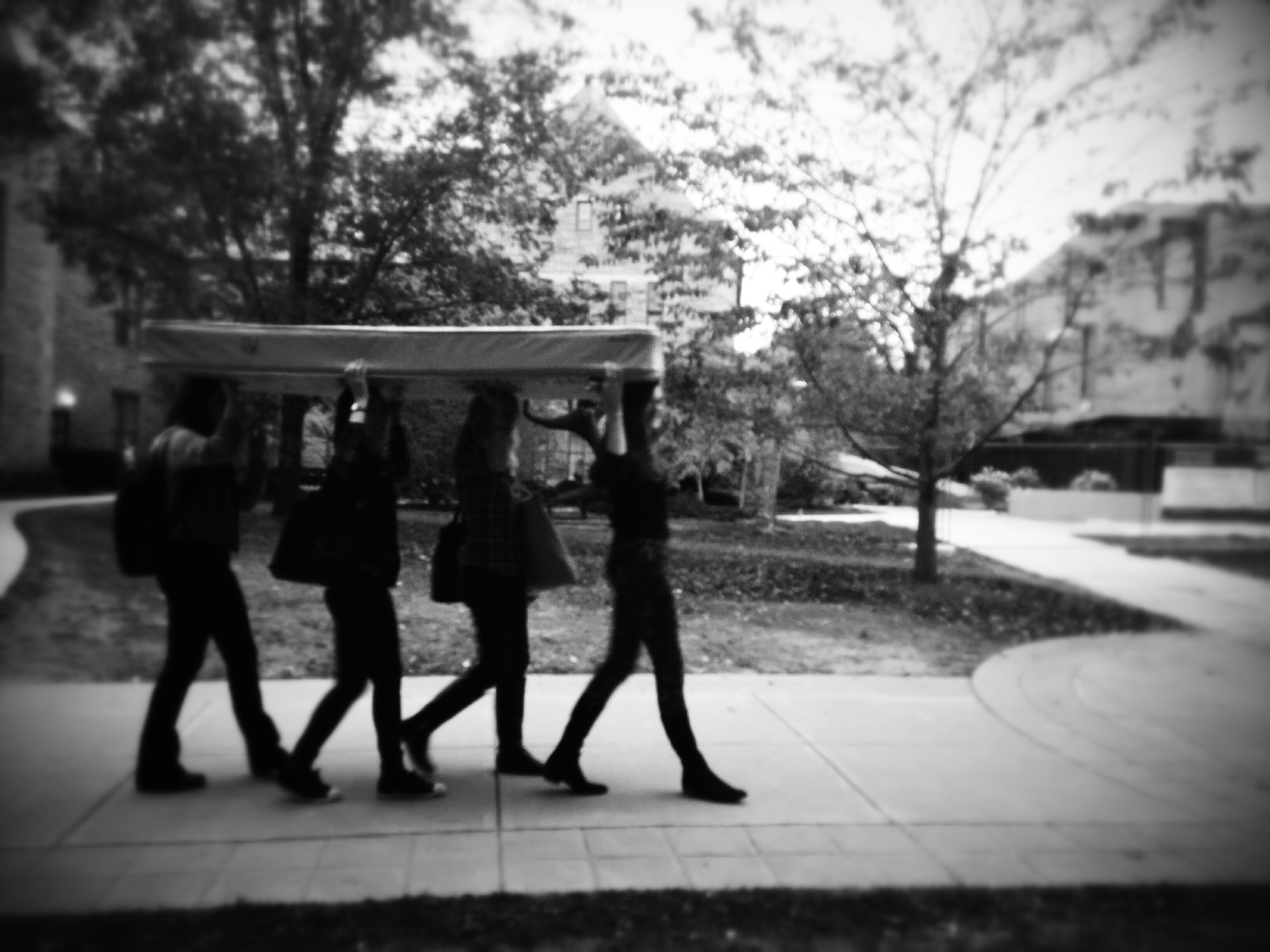On Wednesday, October 29, faculty, staff and students joined together to participate in a National Day of Action against sexual assault. Connecticut College, joined with colleges and universities across the country, took a stand in solidarity with those affected by sexual violence.
The day served as a response to recent events at Columbia University. The Ivy League institution has been at the center of a sexual assault controversy following Emma Sulkowicz’s decision to carry her mattress across campus everyday as a part of her senior art project.
The performance piece seeks to raise awareness of Columbia’s negligent response to her on-campus rape that she reported to the University. After bringing the incident to the attention of administration, the situation was investigated, but her rapist was found to be not guilty despite multiple other filings on account of his behavior. Her actions have recently gone viral both among college campuses and throughout mainstream media.
The idea to hold an event at Connecticut College was developed by Professor David Jaffe’s sophomore research seminar, Art of Protest: Occupy ___. The opportunity to participate in such a critical national movement struck a chord with many members in the course.
“This is the first time the class decided as a group to engage in some sort of community social engagement together. It was all them, and that was truly so exciting for me,” Jaffe described.
The idea for the event was then presented to the SGA’s Art Task Force, led by Sal Bigay ’16. After the project was brought to SGA, members of The Think Safe Project, led by Darcie Folsom, were also quick to jump on board.
“One of the greatest things about this project is it came from so many different student initiatives. People saw this and saw what a perfect project it was for our campus,” Bigay explained.
Although there was clearly an abundance of support for the day of solidarity, perhaps the greatest challenge faced by its supporters was time. After the idea to create this day long event on campus was developed, it was determined that in order to participate in the national day of awareness, students would have just a week to prepare and publicize the event on campus. The group was faced with an incredible amount of decisions regarding how the day would run and how to make it effective and relevant for the Connecticut College community.
Perhaps one of the most pressing discussions was whether the event would be considered a protest as it was originally developed by Sulkowicz. After thorough discussion, however, it was confirmed that the event would be awareness-based,
“It wasn’t a protest—we’re content with how our administration is handling this. But rather, it is solidarity to show respect for this national movement and for those affected by instances of sexual violence every day,” said Jaffe.
Connecticut College certainly has an outstanding reputation in regards to our action and awareness of sexual assault. Darcie Folsom, the director of Sexual Violence Prevention and Advocacy on campus, explained that we cannot take all that we have here for granted.
“It’s easy to get so caught up on our bubble on the hill and think about what’s affecting Conn, and having this day of solidarity across the country is such an important way to continue awareness raising across the country. Students all over are raising a voice for this issue and demanding attention from their institutions. That’s how I got here. Students recognized a need for my position, and the institution listened. So I’m hoping this activism will encourage other administrators to do more of this necessary work.”
In regards to the criticisms faced by Columbia’s administration, Folsom added, “The media has the ability to twist just about anything, so I can’t comment on what a school may or may not have done, but I can remark on the courage and strength of Emma in saying, ‘This cause is important to me, and I want my voice to be heard.’”
In the distinct style of Sulkowicz, student participants signed up for shifts throughout the day of classes from 9am to 4am to carry the mattress across campus. Members of the student body were also encouraged to carry pillows with them to classes to express their commitment and dedication to the cause.
“The pillow idea is one that came out of a national movement: if you can’t bring a mattress, bring a pillow to represent your solidarity. We have this primary object, the mattress, and then the pillows are demonstrations to the connection of that primary object,” Jaffe highlighted.
Furthermore, throughout common hour, students of Jaffe’s class placed the mattress on display directly in front of Harris. Students were offered opportunities to sign their names on the mattress to affirm their dedication to the movement and were allowed the opportunity to take pictures next to it in order to raise further awareness.
“We now have physical evidence of people who want to raise awareness for Emma and nationwide. So when you look at this mattress and see 300 names on it, that’s a pretty powerful statement,” reflected Jaffe.
At the end of the day, the mattress was brought to Cro for final viewing by the Connecticut College community.
It is also important to note that institutions like Conn are not the only ones taking a stand against these issues. Along with college campuses across the country, the White House recently announced a new campaign, “It’s on us,” in an effort to combat the growing number of incidents and reports of sexual violence on college campuses.
“The fact that the campaign surrounds the idea that ‘it’s on us,’ meaning it’s the responsibility of the bystanders to make a change is fantastic. In past years, it has surrounded the ‘blame the victim check-list,’” Folsom explained.










